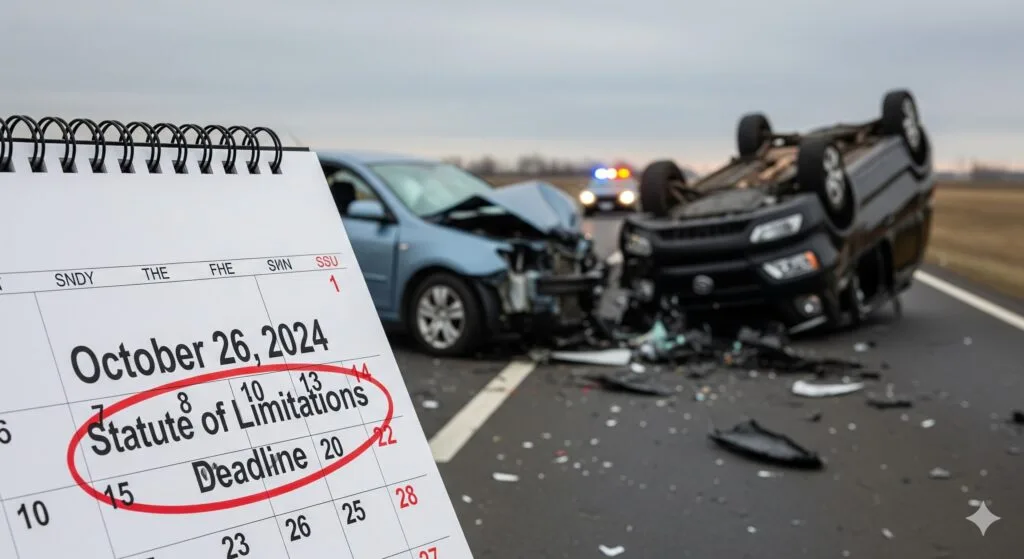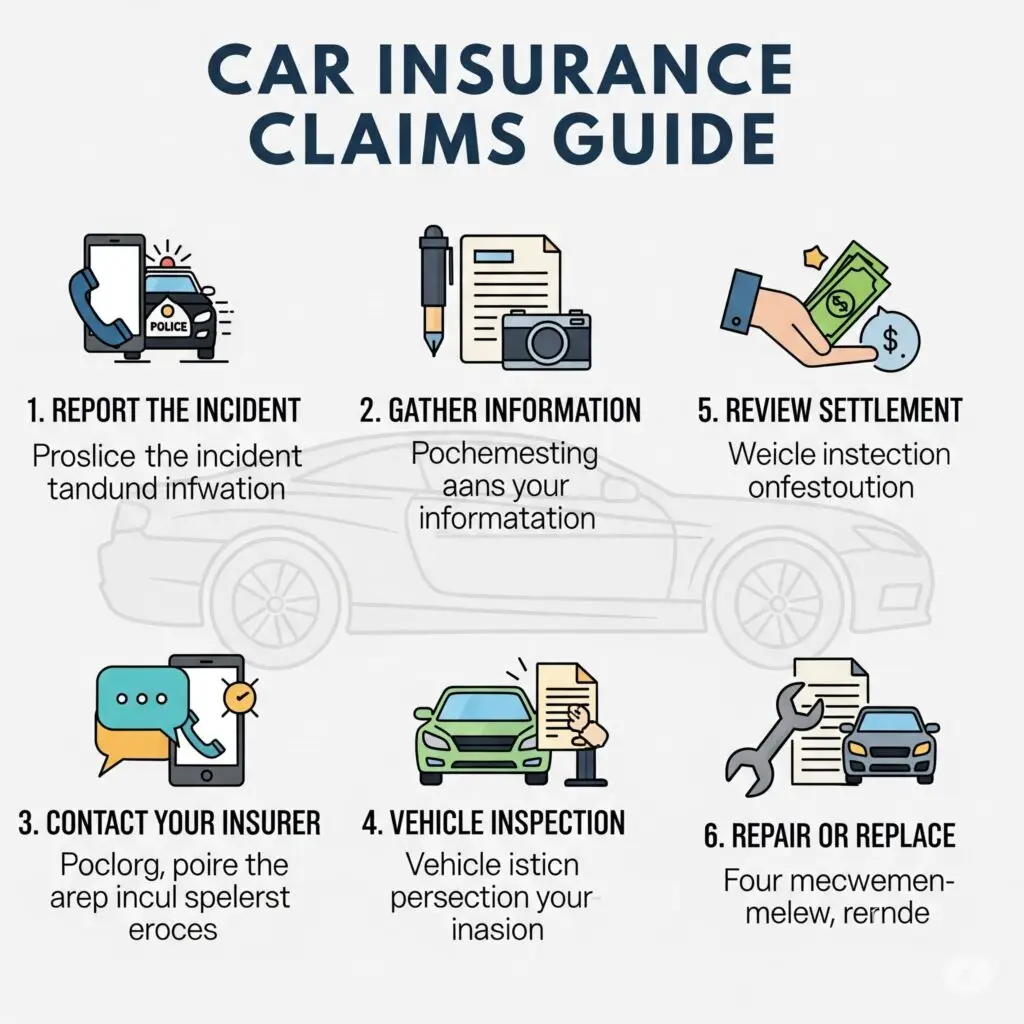The sudden, jarring impact of a car accident is just the beginning. In the confusing moments that follow, you are thrust into a process you never asked to be a part of—dealing with insurance companies.
You dutifully pay your premiums, assuming your insurance provider will be there for you when you need them most. However, it’s crucial to understand a fundamental truth: an insurance company is a business. Its primary goal is to protect its bottom line by paying out as little as possible on claims. The friendly adjuster on the phone has a job, and that job is not to ensure you get every penny you deserve.

Imagine navigating this complex process with confidence, armed with the knowledge to protect your rights. Imagine understanding what your claim is truly worth and having a clear strategy to counter lowball offers and delay tactics. This guide is designed to give you that control and put you on the path to securing the full and fair compensation you are legally entitled to.
Read on to learn the essential legal advice for handling every stage of your car insurance claim. By understanding the dos and don’ts, you can protect yourself and your family’s future.
Chapter 1: The First 24 Hours – Your Actions Matter Most
What you do in the immediate aftermath of a car accident sets the foundation for your entire insurance claim. Every action, every word, and every piece of information you collect can significantly impact the outcome. This is your first opportunity to protect your legal rights.
DO: Critical Steps to Take at the Scene
Think of yourself as the first investigator on your case. Your priority is to gather facts while ensuring everyone’s safety.
- DO Call 911 Immediately: This is non-negotiable, even for minor accidents. A police report is an official, unbiased account of the incident. It is one of the most potent pieces of evidence you can have. Insurance adjusters rely heavily on this report to determine fault.
- DO Seek Medical Attention: Your health is the top priority. Even if you feel “fine,” adrenaline can mask serious injuries like whiplash or internal bleeding. Seeking immediate medical treatment creates a direct, time-stamped link between the accident and your injuries, which is vital for your claim.
- DO Document Everything with Photos and Videos: Use your smartphone to become a meticulous documentarian. Take pictures and videos of:
- The position of all vehicles is recorded before they are moved.
- Damage to all cars from multiple angles (close-up and wide shots).
- License plates of all involved vehicles.
- Skid marks on the road and any debris.
- Road signs, traffic signals, and the general intersection.
- Any visible injuries you have?
- DO Exchange Information Calmly: Collect the following from all other drivers:
- Full Name and Contact Information
- Insurance Company and Policy Number
- Driver’s License Number
- License Plate Number
- DO Get Witness Information: Independent witnesses are incredibly valuable. If anyone witnessed the accident, please ask them to provide their name and phone number. Their testimony can be crucial if the other driver changes their story later.
DON’T: Common Mistakes That Can Ruin Your Claim
What you don’t do is just as important as what you do. Avoid these common pitfalls.
- DON’T Admit Fault or Apologise: Phrases like “I’m so sorry” or “It was my fault” can be legally interpreted as an admission of guilt, even if you were just being polite. Stick strictly to the facts of what happened. Let the investigators and legal professionals determine fault.
- DON’T Speculate About What Happened: If you are unsure about speeds, distances, or specific sequences of events, do not guess. Simply state what you know for sure. Saying “I think they were going too fast” is less helpful than “I saw their car approaching and then the impact happened.”
- DON’T Discuss Your Injuries in Detail: At the scene, it’s okay to say you are hurt and need medical attention. However, do not downplay your injuries by saying “I’m okay” or “I just have a few bumps and bruises.” You are not a doctor, and the full extent of your injuries may not be apparent for days.
- DON’T Post About the Accident on Social Media: Insurance companies actively search social media profiles for any information that can be used against you. A photo of you at a family barbecue a week later could be used to argue your injuries aren’t as severe as you claim. It is best to refrain from posting anything about the accident or your recovery.
Chapter 2: The Investigation – Navigating the Insurance Adjuster
Once you report the accident, you will be contacted by an insurance adjuster. They may be from your insurance company or the other driver’s insurance company. It is essential to understand their role and how to interact with them to protect your interests.
The Adjuster’s True Role
The insurance adjuster’s job is to investigate the claim and determine how much the insurance company should pay. They are trained negotiators whose goal is to resolve your claim for the lowest possible amount. They are not your advocate.
DO: Best Practices When Speaking to an Adjuster
- DO Be Polite and Professional: You can be firm without being rude. A cooperative but cautious attitude is most effective.
- DO Stick to the Facts: Provide the basic, factual information about the accident: where and when it happened, the vehicles involved, and the name of the police department that responded.
- DO Keep a Detailed Log: Every time you speak with an adjuster, write down the date, time, their name, and a summary of what was discussed. This log can be invaluable later.
- DO Provide Documentation: Willingly provide copies of the police report and photos you took at the scene. You can also provide receipts for expenses you have already paid, like towing fees.
DON’T: Critical Errors to Avoid with the Adjuster
- DON’T Give a Recorded Statement Without Legal Advice: This is one of the most critical pieces of legal advice. Adjusters will often ask for a recorded statement early on. You are not required to provide one, especially to the other driver’s insurance company. They can use your own words, taken out of context, to deny or devalue your claim. It is always best to consult with an attorney before agreeing to any recorded statement.
- DON’T Sign Any Documents Without Review: The adjuster may send you a stack of forms. Pay close attention to a blanket medical authorization form. This gives them access to your entire medical history, not just records related to the accident. They can then try to argue that your injuries were pre-existing. Never sign such a broad authorization.
- DON’T Accept the First Offer: The first settlement offer is almost always a “lowball” offer. It is a starting point for negotiation, and they expect you to either accept it out of desperation or negotiate.
- Don’t feel rushed: Adjusters may create a sense of urgency, suggesting an offer is only available for a limited time. This is a pressure tactic. You have time to evaluate your injuries, damages, and the offer.
Chapter 3: Understanding Your Claim’s True Value
One of the main reasons for claim disputes is a disagreement over the value of the damages. Insurance companies will try to minimize this value. Legal advice is crucial for understanding what you are truly owed. Damages are typically broken into two categories.
Economic Damages: The Tangible Costs
These are the direct, calculable financial losses resulting from the accident. You must keep detailed records of every expense.
- Medical Expenses (Past and Future): This includes everything from the initial ambulance ride and emergency room visit to surgeries, physical therapy, prescription medications, and chiropractic care. If a doctor determines you will need future medical care because of the accident, that must be calculated and included.
- Lost Wages: This is the income you have already lost from being unable to work. You will need pay stubs and a letter from your employer to document this.
- Loss of Earning Capacity: If your injuries are permanent and prevent you from returning to your previous job or earning the same amount of money you did before the accident, you can claim compensation for this future loss. This often requires expert testimony to calculate.
- Property Damage: This is the cost to repair or replace your vehicle and any personal property inside it that was damaged, such as a laptop or car seat.
Non-Economic Damages: The Intangible Costs
These damages are harder to calculate but are just as real. They compensate you for the human cost of the accident. This is where an experienced attorney is most valuable.
- Pain and Suffering: This compensates for the physical pain, discomfort, and emotional distress you have endured because of your injuries.
- Emotional Distress: This can include anxiety, depression, fear, sleep disturbances, and PTSD that develop as a result of the traumatic event.
- Loss of Enjoyment of Life: If your injuries prevent you from participating in hobbies, activities, or family life that you previously enjoyed, you can be compensated for this loss.
- Loss of Consortium: This is a claim that a spouse can sometimes make for the loss of companionship, affection, and services due to the victim’s injuries.
Chapter 4: Key Legal Concepts Made Simple
Legal principles govern the world of insurance claims. Understanding these basics will empower you during the process.
Negligence: The Foundation of Fault
In most states, the person who was careless or broke a traffic law is considered “negligent” and therefore at fault. To win a claim, you generally need to show four things:
- Duty: The other driver had a duty to operate their vehicle safely.
- Breach: They breached that duty (e.g., by speeding, texting, or running a red light).
- Causation: Their breach directly caused the accident.
- Damages: You suffered actual damages (injuries, property damage) as a result.
Comparative Negligence: What if You’re Partially at Fault?
Many states, including Illinois and Florida, follow a “modified comparative negligence” rule. This means you can still recover damages even if you were partially at fault, as long as your share of the fault is not 50% or more (or 51% in some states). However, your final compensation will be reduced by your percentage of fault. For example, if you are awarded $100,000 but found to be 20% at fault, your recovery would be reduced by 20% to $80,000. Insurance companies often try to assign a higher percentage of fault to victims to reduce their payout.

Statute of Limitations: The Ticking Clock
Every state has a strict deadline for filing a personal injury lawsuit, known as the statute of limitations. This can range from one to several years, depending on the state. If you miss this deadline, you lose your right to sue forever. This is one of the most compelling reasons to get legal advice early in the process.
Insurance Bad Faith: When Your Insurer Acts Unfairly

Your own insurance company has a legal duty to act in “good faith.” This means they must treat you fairly and handle your claim honestly. If they unreasonably deny, delay, or underpay your claim without a valid reason, they may be acting in bad faith. Signs of bad faith include:
- Failing to conduct a proper investigation.
- Misrepresenting the terms of your policy.
- Refusing to pay a valid claim without explanation.
- Offering a settlement that is far below the actual value of your damages.
If you suspect bad faith, it is critical to speak with an attorney, as you may be able to sue the insurance company for more than the original value of your claim.
Chapter 5: When to Hire a Car Insurance Claim Lawyer
While you can handle very minor claims on your own, certain situations strongly signal the need for professional legal advice on your car insurance claim.
You should seriously consider hiring an attorney if:
- There are serious injuries, permanent disability, or a fatality.
- The fault for the accident is being disputed by the other driver or their insurance company.
- The insurance company denies your claim or refuses to make a fair settlement offer.
- You suspect the insurance company is acting in bad faith by delaying your claim or using deceptive tactics.
- Your claim involves an uninsured or underinsured motorist (UM/UIM). These claims are filed against your own insurance company, which can create a conflict of interest.
- The settlement offer does not cover all of your medical bills and lost wages.
- You are overwhelmed by the process and want a professional to handle the stress of negotiations for you.
Frequently Asked Questions (FAQs) About Car Insurance Claims
Q: How long do I have to file a car insurance claim?
A: You should report the accident to your insurance company as soon as possible, usually within 24 to 72 hours. The deadline for filing a lawsuit (the statute of limitations) is a separate, stricter deadline that varies by state.
Q: What if the other driver was uninsured?
A: This is where your Uninsured Motorist (UM) coverage comes into play. You will file a claim with your own insurance company to cover your damages, up to your policy limits.
Q: How much does a car accident lawyer cost?
A: Most personal injury lawyers work on a contingency fee basis. This means they only get paid if they win your case, either through a settlement or a court verdict. Their fee is a percentage of the total amount recovered, so there are no upfront costs to you.
Q: Should I go to a doctor recommended by the insurance company?
A: It is generally not recommended. You have the right to see your doctor or a trusted medical professional. A doctor hired by the insurance company may have a bias toward minimizing the extent of your injuries.
Q: What should I expect during a free legal consultation?
A: During a free consultation, the attorney will listen to the details of your case, review your documents (like the police report), explain your legal rights, and give you an honest assessment of your claim’s potential. There is no obligation to hire them afterwards.
Conclusion: Your Rights, Your Recovery
Navigating a car insurance claim is a journey filled with potential pitfalls. By being prepared, documenting everything, and understanding the tactics used by insurance companies, you can significantly improve your chances of a fair outcome.
Remember, you do not have to go through this alone. The law provides protections for accident victims, and a qualified personal injury attorney can be your most powerful ally. Their role is to level the playing field, handle the complex negotiations, and fight to ensure you receive the compensation you need to heal and move forward. If you feel overwhelmed or believe you are being mistreated, seeking legal advice is not a sign of weakness—it is the smartest step you can take to protect your future.





